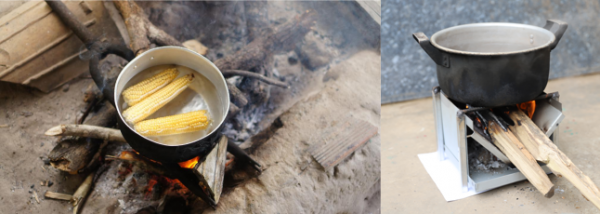In developing countries where the majority of the population still uses open biomass-fired cookstoves for household cooking, the introduction of improved cookstoves that increases energy efficiency or new renewable efficient cooking fuel (fuel switch) can help reduce fuelwood consumption and hence reduce GHG emission. Depending on the types of projects (energy efficiency or fuel switch), different methodologies will be applied for calculating the emission reduction of the stoves. This reduced emissions can further be converted into carbon credits under international mechanisms such as Clean Development Mechanism (CDM) of the Kyoto Protocol, the Verified Carbon Standard (VCS), the Gold Standard (GS) and other market mechanisms.

Traditional open-fired stove (left) / Improved stove (right)
Besides climate benefits when reducing 40-60% fuel consumption, improved cookstoves have other co-benefits to the natural environment and the society in areas where introduction/dissemination projects are implemented. As 50% of world wood is harvested for using as a fuel source and 30% of that is estimated to come from unsustainable sources, cookstove projects could help reduce deforestation and biodiversity loss of local woodland. The health benefits from those stoves are significant as they produce nearly no smoke. According to WHO, indoor smoke is the cause of 1.9 million deaths every year in Africa where traditional open fires for cooking are widely used. In terms of gender benefits, women who are traditionally responsible for cooking and collecting fuelwood can save their time and have less exposure to the damaging smoke. They can spend more time for themselves or participate in other socio-economic activities. Those co-benefits are the reasons why cookstove carbon projects credits are favored in the carbon market.
VNEEC is currently providing the consultancy service to The World Bank’s project “Clean Cookstove Initiative (CSI) in Lao People’s Democratic Republic”. The project will be registered as a CDM Programme of Activities (PoA) for the issuance of CERs. We are also collaborating with other partners in Africa to survey the potential of implementing similar projects in this continent.
Nguyen Viet Can
References
https://energypedia.info/wiki/Carbon_Funding_for_Cookstoves
https://www.givinggreen.earth/carbon-offsets-research/fuel-efficient-cookstoves
https://circularecology.com/carbon-offset-projects/clean-cookstoves-africa.html
9,420 views, 2

Tags:
Bài viết liên quan